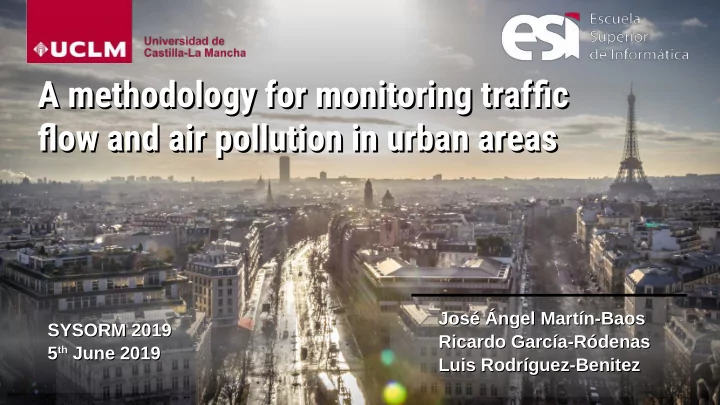

A methodology for monitoring traffjc A methodology for monitoring traffjc fmow and air pollution in urban areas fmow and air pollution in urban areas José Ángel Martín-Baos José Ángel Martín-Baos SYSORM 2019 SYSORM 2019 Ricardo García-Ródenas Ricardo García-Ródenas 5 th 5 th June 2019 June 2019 Luis Rodríguez-Benitez Luis Rodríguez-Benitez
Content Content 05 Conclusions 04 Results 03 Methodology Research Questjon 02 Introductjon 01 2
Introduction Introduction Strategic level Strategic level Traffic Network Layout Traffic Network Layout Tactic level Tactic level Capacity enhancement problem Capacity enhancement problem Signal setting problem Signal setting problem Toll pricing problem Toll pricing problem Demand adjustment problem Demand adjustment problem Operational level Operational level Real traffic control Real traffic control 3
Operational level Operational level Real traffic control Real traffic control Technologies Methodology Technologies Methodology Proyect awarded by: 4
Research Question Research Question ● Emission monitoring: ● Low cost devices ● Distributed environment 5
Traffic pollution Traffic pollution in Europe in Europe % change relative to 1990 6 Years Source: European Environment Agency
Environmental Environmental labels in Spain labels in Spain 7 Source: www.cocheando.es
Methodology Methodology 8
Raspberry Pi Raspberry Pi 9 Source: www.raspberrypi.org
Motion Vectors Motion Vectors 10
Obtain the motion Obtain the motion vectors vectors 11
Obtain the motion Obtain the motion vectors vectors 12
Simple moving Simple moving average average 13
Algorithm to Algorithm to count vehicles count vehicles n_vehicles 0 ← 1 car_detected False ← 1 growth 0 ← 1 GROWTH_LIMIT 5 ← 1 WIDTH_THRESHOLD 10 ← 1 HEIGHT_THRESHOLD 150 ← 1 SMOOTH_ORDER 6 ← 1 /* Repeat for each frame in the video */ mv ← 1 smooth (mv, SMOOTH_ORDER) 14
Algorithm to Algorithm to /* Repeat for Left and Rigth direction */ count vehicles count vehicles if mv[previous frame] < mv and growth < GROWTH_LIMIT then growth growth + 1; ← 1 else if mv[previous frame] > mv and growth > - GROWTH_LIMIT then growth growth - 1; ← 1 end if mv >= HEIGHT_THRESHOLD and growth > 0 then n_positive_frames n_positive_frames + 1; ← 1 if n_positive_frames >= WIDTH_THRESHOLD and car_detected = False then car_detected True; ← 1 n_vehicles n_vehicles + 1; ← 1 end else if growth = - GROWTH_LIMIT then car_detected False; ← 1 n_positive_frames ← 1 0; end 15
Algorithm to Algorithm to count vehicles count vehicles DEMO 16
Connection Connection diagram diagram 17
IBM IoT IBM IoT Platform Platform Publish: "24 ºC" T opic: "T Publish: "24 ºC", emperature" Raspberry Pi Publish: "22.5 ºC" MQTT Sensor Broker Publish: "22.5 ºC" Subscribe to: "T emperature" emperature" Server opic: "T T Raspberry Pi Sensor 18
Results Results 19
~ 9 ~ 90 % % average percentage hits using 23 test videos in a street with one line in each direction 0,4% of the information used compared to traditional video analysis techniques ,0024 seconds per frame ~ 0,0 ~ 0 ~ 0 ~ 0,0 ,0024 20
Web Page Web Page 21
Web Page Web Page 22
Web Page Web Page 23
Web Page Web Page 24
Conclusion Conclusion ALGORITHM MONITOR Motion vectors allows to use We are able to monitor statistical techniques to simultaneously road traffic detect vehicles without and air pollution using a processing the image itself. low-cost device. ~90% of vehicles detected. Low CPU resources (~10%). Fast (~0,0024 s/frame) COMUNICATION FUTURE WORK We are able to communicate Implement a machine learning based methodology to all the information to the estimate the air quality cloud using IBM services, evolution using the data were it can be processed. provided by this infrastructure and recommend palliative 25 actions.
Thank you for your attention José Ángel Martîn Baos Universidad de Castjlla-La Mancha JoseAngel.Martjn@uclm.es htups://linkedin.com/in/joseangelmartjnb/
Recommend
More recommend